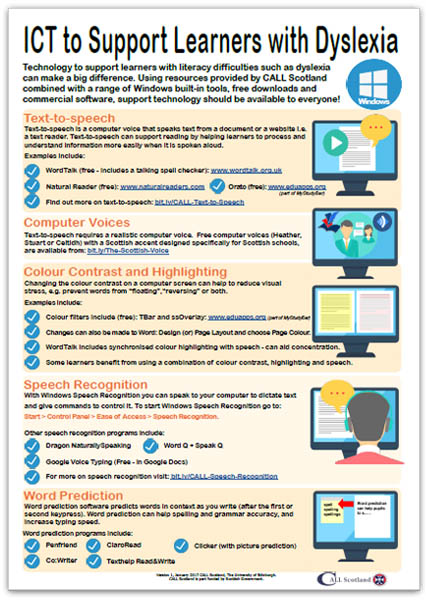Details
A3 sized PDF poster - revision 1.0, published 2017
Description
Technology to support learners with literacy difficulties such as dyslexia can make a big difference. Using free resources provided by CALL Scotland such as WordTalk, the Scottish Voices, Books for All, combined with a range of Windows built-in tools, free downloads and commercial software, support technology should be available to everyone.
This infograph highlights a range of support tools that are compatible with the Windows Operating System (OS) into 5 categories:
- Text-to-speech
- Computer Voices
- Colour Contrast and Highlighting
- Speech Recognition
- Word Prediction
Due to layout and space restrictions, some tools have been omitted, although they play an important part in supporting literacy. For example, the Spelling and Grammar checker in Microsoft Word can help learners to identify and amend spelling and grammar mistakes. The keyboard shortcut F7 is a quick way to identify spelling errors.
Also in Microsoft Word AutoText and AutoCorrect can be used to automatically correct common spelling errors such as 'teh' to 'the' or 'acomodation' to 'accommodation'.
Using a Windows computer, whether a desktop or tablet, is a great way of reading accessible books from the Books for All Database, as books in PDF format can be adjusted to suit the needs of different learners, such as background colour, magnification or speech.
For more on reading and writing support visit the CALL Dyslexia section of the website.
And don't forget, ensuring that pupils have access to support technology is a legal requirement, a responsibility we all have. CALL has produced friendly step-by-step guides based on Scottish Government guidance to help: Legal Requirements for Computer Accessibility and Inclusive Learning Resources.This poster is designed to be printed in A3. The electronic copy (PDF) includes clickable links to resources.



Our social media sites - YouTube, Twitter and Facebook